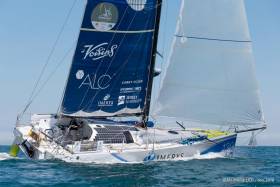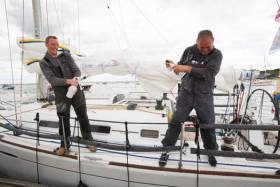Displaying items by tag: RB&I
#RB&I - A record 10 Class40s have entered the Sevenstar Round Britain and Ireland Race and more are expected to take up the tough 1,800 nautical mile non-stop race this August.
Starting and finishing from Cowes on the Isle of Wight, the course takes the fleet as far north as Muckle Flugga in the Shetland Islands on the 61st parallel — shared by Alaska and the Bering Sea.
The 2018 race is an official event for the 2018 Class40 circuit and since the class first competed in the race in 2006, only five have finished the gruelling challenge.
In 2006, Britain’s Phil Sharp became the first Class40 skipper to finish the race and he went on to win the Route du Rhum later that year.
Fast forward to June 2018 and Sharp with co-skipper Julien Pulve was victorious in the 1,000nm Normandy Channel Race, winning by just six seconds after six days of racing.
For the 2018 Sevenstar Round Britain and Ireland Race starting on Sunday 12 August, Sharp will skipper Class40 Imerys and is one of the favourites to win the class.
“The diversity of racing around Britain and Ireland is a real challenge. You can get everything possible thrown at you. Just finishing gives tremendous satisfaction and makes you all the stronger for it,” Sharp said.
“We didn’t do very well in 2006, but it was my first proper race in the Class40 and it was invaluable for the win in the Route du Rhum.
“It is a coastal race but you rarely see land and the course takes you further north than just about any offshore race. The weather can get very extreme and very cold. Racing in howling winds, fully in winter gear, makes it very easy to forget it is August.
“Pushing the boat to the limits can be stressful, but it is an amazing experience, surfing down waves getting doused in blue water. A Class40 transforms itself into a dinghy, especially the modern ones which are highly optimised racing machines.”
The majority of the Sevenstar Round Britain and Ireland Race fleet will be racing under the IRC Rating system with additional classes for Class40, MOCRA and IMOCA. This year’s race is also expected to have a record entry for two-handed challengers, among them Liam Coyne’s Lulu Belle.
All boats will carry trackers and full coverage of the race is available on the Sevenstar Round Britain and Ireland Race website.
Date Set For Round Britain And Ireland Two-Handed Race In 2018
#RB&I - The Royal Western Yacht Club of England has announced that the next edition of the Round Britain and Ireland two-handed race will start from Plymouth on Sunday 3 June 2018.
It marks the 14th running of the quadrennial yacht race, which was established in 1966 by the Cockershell hero Major Blondie Hasler.
The most recent edition in 2014 saw Liam Coyne and Brian Flahive on Lula Belle become the first two-handed team to win the race, which comprises five legs totalling some 2,000 miles on a course sailed clockwise around the British Isles and Ireland, leaving all islands and rocks to starboard.
The event is open to professional and amateur yachtsmen in mono and multihulls between 28ft and 5ft in length overall.
Race director David Searle, a former race competitor and current member of the Royal Western YC, anticipates a strong local and international entry of up to 60 boats to contest what’s described as one of the world's toughest coastal two-handed races.
The race record stands at 15 days and seven hours, but sailors should allow about 23 days to complete the course, including the four 48-hour rest-and-repair stopovers in Kinsale, Castle Bay, Lerwick and Lowestoft.
The Notice of Race and entry form can be found at the Round Britain and Ireland Yacht Race website HERE.






























































